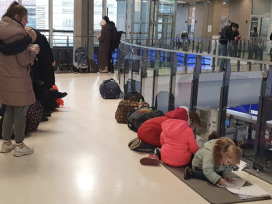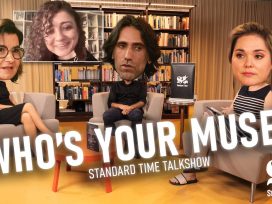
'It’s important to be open'
A Knowledgeable Youth podcast
Remaining in a new country or returning home? The Knowledgeable Youth podcast delves into the complex decision-making refugees face when migrating, together with researcher Olena Yermakova.
This interview first appeared in “Crosswords”, a multilingual and transnational journal on multilingualism and digital networking, published in the context of “crosswords X mots croisés. 21st European Meeting of Cultural Journals” in Paris 2008.
Read Emrah Efe Çakmak’s interview with Homi Bhabha
Emrah Efe Çakmak: The question being asked to all the participants of this publication is, “How much in common does a community need?” From the perspective of a difference-embracing philosophy, such a formulation could seem awkward. How do you receive this question? Is this the proper way of addressing difference and communality?
Mark C. Taylor: In the history of the West, and perhaps not only the West, there is one central preoccupation: the problem of the one and the many. This is, of course, a philosophical and theological problem; less often noted and no less important, however, is that it is also a psychological and a political problem. Surely the twentieth century testifies to the magnitude of that problem. During the latter half of the twentieth century, many philosophers and social critics became preoccupied with issues of difference and otherness. This was in large measure a response to totalitarianism on the Left and on the Right. The whole point of the analyses of thinkers like Derrida, Foucault and Lacan was to disrupt the philosophy of identity, given that it can have such devastating political consequences.
But the pendulum swung too far in the other direction and a fetishism of difference began to emerge. Ironically, the philosophy of difference led to a politics of identity. In different ways, Maurice Blanchot and Jean-Luc Nancy exposed the implications of this position when they argue that what we have in common is that we have nothing in common.
Of course, this issue is not only philosophical or even political. While these developments were unfolding, other changes were occurring that recast the question of community – the first is technological and the second is environmental. There is an interesting relationship between the emergence of post-structuralism and new information and communications technologies. While some see in networks a tendency to totalization and hegemony, other see a growth in pluralism and diversity. While there is some truth in both of these positions, it is undeniable that much of the conflict plaguing the world today is a result of the increasing interconnectedness that globalization brings. As distance vanishes, differences become more evident and conflict seemingly becomes inevitable.
The second issue that is relevant in this context is the environment and climate change. If we study physical, chemical and biological processes, it is undeniable that living as well as non-living systems are complex networks. What the philosophy of difference fails to realize is that being is relational. This is not a social construct created for political purposes; to the contrary, it is a fact that we ignore at our peril.
The question is whether community is possible any longer and if so, on what scale? It is not difficult to observe localized communities today. But it is more difficult to imagine a broader, perhaps even a global community. It is precisely the preoccupation with local interests that makes a broader community so difficult to imagine.
Protests to the contrary notwithstanding, I would insist that we are in fact a global community and all members have much in common. In part, this rests upon my understanding of technological and natural networks. As Nietzsche once said, everything is entwined, enmeshed. Ontology harbors axiology – is implies an ought. On a more specific level, what everyone has in common is the prospect of imminent climatic disaster, which will mark the end of human life on this planet. For Heidegger, being-towards-death constituted the singularity of each person; when death is universal, being-towards-death holds out the prospect of creating community.
EEÇ: How can we think about the relation between territory, language and identity in a post-national world without giving way to identitarian linguistic politics? What would be the communicative prerequisites for transnational, multilingual public spheres such as the ones we are working to establish?
MT: The language of the question is an echo of the past and reflects a political agenda that has not adapted to the present. Consider the terms: “post-national world”, “identitarian linguistic politics”, “communicative prerequisites”, “transnational spheres” and “multilingualism”. We know what these terms mean and readily understand their implications. But they shed no new light on what is occurring. If language is important, and it is, we must fashion a new language.
What I want to stress is that language in today’s world is not primarily verbal but is, more importantly, visual. The problem is that we are visually illiterate – and nowhere is this more evident than in the university. In the “real” world, image trumps word every time; in the academic world, word represses image all the time. If communication is going to become effective on a global scale, we must liberate the image from the tyranny of the word. This does not mean giving up reading and writing as they have been known in the past. But it is no longer enough. The multilingualism of young people today is multimedia. If we do not learn to communicate in this language, we will have nothing to say.
EEÇ: What could be the role of political and cultural jounals in a changing media enviroment?
MT: Books and journals as we have known them are a thing of the past. Unfortunately, the last to understand this fact are universities and academics. Having said that, the question of how to respond remains to be addressed. In the coming decades, computing will become increasingly distributed and embedded. The movement from the PC to the handheld radicalizes decentralization and changes the nature of communication. People often complain – at least, professors do – that young people do not read anymore. But that is not true. They read all the time but they do not read books or long texts. Mobile technologies scramble everything and make it necessary to recast the terms of analysis. I do not think “transnational” is a useful term here. Again, it smacks of the past and does not help us to understand the reconstitution of political space that has already occurred. Think of everything as a web with constantly shifting nodes, which might be personal, social, economic or biological. The question is where and how to plug into this network.
For the most part, presses and journals as they now exist do not serve the interests of intellectual or cultural development. To the contrary, their proliferation is symptomatic of increasing hyper-specialization in which there is more and more about less and less. This is going in the opposite direction of history, in which there is increasing interconnectedness. So my advice is to forget journals – I no longer read any academic journals and I stopped publishing in them years ago. The only function presses and journals serve is to authorize those who write for them among a dwindling group of peers. If ideas are to matter – and I believe it is crucial that they do – we must completely change the way in which they are communicated.
Published 30 December 2008
Original in English
First published by Crosswords 1/2008
© Emrah Efe Çakmak / Crosswords / Eurozine
PDF/PRINTSubscribe to know what’s worth thinking about.

Remaining in a new country or returning home? The Knowledgeable Youth podcast delves into the complex decision-making refugees face when migrating, together with researcher Olena Yermakova.

Human history is a history of migration, and people continue to be on the move due to a myriad of circumstances. Most of them aren’t merely looking for adventure or doing a fun gap year, but are trying to escape political persecution, climate catastrophes, and, well, war and genocide.